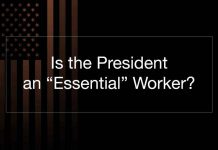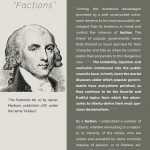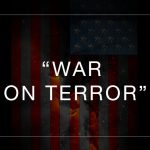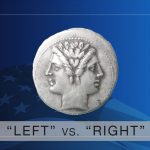Last Updated on October 4, 2021 by Constitutional Militia
A militarized police state is coming to this country—into your own neighborhood, and with you and your family as its targets —unless you start, right now, to enforce the Constitution, as is your right and your duty.
In addition to their long-standing strategy of “federalizing” and para-militarizing State and Local police departments under the General Government’s Department of Homeland Security, the big brains in the Disgrace of Columbia have two additional schemes openly in the works: (i) the overtly military, which depends upon the deployment of the Armed Forces as domestic police; and (ii) the covertly military, which depends upon the creation of some new, ostensibly civilian, “national-security force.”
The question is, “What should patriotic Americans do about this situation?”
[A] The government of the United States is a type of political machinery. When in doubt about how to use any piece of machinery safely and effectively, the prudent operator should first consult the manufacturer’s set of instructions—in this case, the Constitution. The Constitution explicitly provides for four, and only four, “homeland-security” establishments:
(i) “the Militia of the several States” [Article I, Section 8, Clauses 15 and 16; Article II, Section 2, Clause 1; and the Second Amendment];
(ii) “Armies” [Article I, Section 8, Clause 12];
(iii) “a Navy” [Article I, Section 8, Clause 13]; and (iv) “Troops” and “Ships of War” that the States may “keep * * * in time of Peace”, but only “with[ ] the Consent of Congress” [Article I, Section 10, Clause 3].
Of these, only the Militia are described as “necessary” for “security”: “[a] well regulated Militia, being necessary to the security of a free State, the right of the people to keep and bear Arms, shall not be infringed” [Amendment II]. And not just for “security” in some general sense, but specifically for “the security of a free State.” The Second Amendment, through the Militia, guarantees an actual “State,” with independence and sovereignty—not just some impotent subdivision of a regional or global supra-national conglomeration in which each constituent nation has lost its original unique identity and authority for self-governance. And the Second Amendment, through the Militia, guarantees “a free State”—a State in which the people actually (not merely theoretically) govern themselves, because that is the only form of political organization entitled to the adjective “free.” Thus, the Second Amendment, through the Militia, preserves America’s entire political system, including the Declaration of Independence as well as the Constitution of the United States and the constitutions of all the States.
Besides being uniquely “necessary,” the Militia are also the only permanent “homeland-security” establishments the Constitution mandates. Congress is not required “[t]o raise and support Armies” or “[t]o provide and maintain a Navy,” or to allow the States to “keep Troops, or Ships of War in time of Peace,” if any or all of those forces are not deemed “necessary and proper” under the circumstances [see Article I, Section 8, Clause 18]. But neither Congress nor the States may dispense with “the Militia of the several States,” which the Constitution recognizes as preëxisting its own ratification and presumes will continue in existence indefinitely.
The Militia are permanent because they are composed of We the People themselves. Constitutions and governments may come and go; but the People remain. Thus, the Militia are the only constitutional “homeland-security” establishments with any claim to the title “democratic” (in the good sense of that adjective).
The People govern themselves if they, and they alone, exercise supreme political power. In the final analysis, opined Mao Tse- tung rightly, “political power grows out of the barrel of a gun.” The Militia are composed of We the People in their entirety— armed, organized, disciplined, and trained to wield the Power of the Sword. Therefore, the Militia constitute the ultimate embodiment of popular self-government. Indeed, popular self- government is impossible without the Militia.
Not surprisingly then, the Constitution expressly delegates to the Militia the authority and responsibility “to execute the Laws of the Union, suppress Insurrections and repel Invasions” [Article I, Section 8, Clause 15]. As self-governors, We the People must exercise the ultimate power to execute the laws, because directly or indirectly they make all the laws. From the point of view of human sovereignty, We the People are the law —subject only to “the Laws of Nature and of Nature’s God.”
The President, too, has the constitutional responsibility to “take Care that the Laws be faithfully executed” [Article II, Section 3]. And to enable him to perform this duty, the Constitution appoints him as “Commander in Chief * * * of the Militia of the several States, when called into the actual Service of the United States” [Article II, Section 2, Clause 1]. Revealingly, though, the Militia’s subordination to the President can occur only “when [they are] called into the actual Service of the United States.” Otherwise, the Militia are subject to the command of only their own officers—because the Constitution “reserv[es] to the States respectively, the Appointment of the Officers” [Article I, Section 8, Clause 16].
The limiting adjective “actual” appeared in only one other place in the original Constitution: namely, the “actual Enumeration” on the basis of which “Representatives and direct Taxes shall be apportioned among the several States”(Article I, Section 2, Clause 3). But its use was not continued when that provision was reformed by Section 2 of the Fourteenth Amendment. So the now unique presence of that adjective as a condition to the President’s rightful exercise of his authority as “Commander in Chief * * * of the Militia” must have no little significance.
In that context, “actual” means “existing in fact,” “current,” “not spurious,” “real,” “genuine.” Thus, the requirement that the Militia come under the President’s command solely in “the actual Service of the United States” provides a safeguard against any rogue President’s usurpation and tyranny. The requirement of “actual Service” authorizes the Militia, on explicit constitutional grounds, to ascertain for themselves whether any purported commands from such a President relate, at that time and in fact, to genuine, as opposed to spurious or pretended, “Service” in the real national interest— that is, the national interest as We the People understand it. That is eminently sensible. For who else is qualified to make that ultimate determination? If a rogue President and his partisans amongst equally rogue Members of Congress were entitled to say, without fear of legally effective contradiction from the individuals called upon to perform the “Service”, that the “Service” were indeed “actual”, no need would exist for the word “actual” to appear at all. But, “‘[i]n expounding the Constitution * * *, every word must have its due force, and appropriate meaning; for it is evident from the whole instrument, that no word was unnecessarily used, or needlessly added.’” Williams v. United States, 289 U.S. 553, 572-573 (1933). Therefore, the requirement of “actual Service” reflects and reinforces the Second Amendment’s definition of the Militia’s purpose: “the security of a free State,” a “State” in which the People really and genuinely govern themselves, particularly with respect to the critical decision to employ their own martial force in the “Service” of “the common defence.”
In addition, because the Militia, in and through the performance of their rightful functions, are “necessary to the security of a free State,” they have an absolute constitutional duty, as well as a constitutional right, to refuse to accede to commands from a rogue President that are unrelated to, let alone contradictory of, “the actual Service of the United States.”
More than that, if the Militia are “called into the [purported, but false] Service of the United States,” they become the subjects of an unconstitutional act committed in their very presences, because that false “call[ ]” attempts to involve them directly and instrumentally in an illegal enterprise. In those circumstances, they plainly have the authority and the responsibility sine die et per sese “to execute the Laws of the Union” then and there—both in their own self-defense and in the names of their States and of the United States—against the perpetrators of that improper “call[ ]” along with all the latters’ co-conspirators and accomplices, whoever they may be.
All this, of course, is not a matter solely of constitutional theory. The Constitution incorporates the Militia into its federal system because the Founding Fathers were familiar with the Militia’s practical indispensability in many “homeland- security” capacities. Today, the Militia have the opportunity to demonstrate their usefulness in more areas than ever before. For example—
Fully revitalized Militia will provide literally millions of individuals to patrol streets, malls, public places and buildings, and sensitive private businesses—thus maximizing deterrence against both terrorists and common criminals.
Because the Militia are composed of every adult in the community, their revitalization will result in ferreting out every illegal alien who makes his presence known to anyone in any community.
The Militia will stress Local preparedness, independence, and self-reliance in every form, from providing an inventory of the work necessary to repair and upgrade crumbling infrastructure; to securing supplies of food, fuel, medicines, and other critical materials adequate for any emergency; to developing systems of production, distribution, and consumption that the people themselves control, secure from manipulations by outside speculators; to putting into use an alternative constitutional and economically sound monetary system that will protect common Americans from the inevitable and unavoidable collapse of the Federal Reserve System.
With the Militia monitoring polling places and verifying and counting paper ballots, the present-day scourge of voting fraud will end.
Because all elected public officials, police, and bureaucrats will be members of the Militia (albeit exempted from performing most normal Militia duties while serving in those positions), and therefore will be subject to investigation by the Militia for whatever infractions of the law may be credibly alleged against them, political corruption, police brutality, and “the insolence of office” so widespread, entrenched, and uncontrollable today will receive swift, sure, and severe exposure and punishment. And,
When young adults, through Militia discipline and training, recognize that they are being prepared to direct their country’s future under their own authority and in their own interest—when they understand the personal as well as the public purpose and benefit of and from patriotism—then the level of aimlessness, dissipation, drug use, and gang violence so prevalent among today’s youth will shrink into insignificance.
Regrettably, this picture of real social progress and “change we can believe in” because common Americans would themselves cause it to happen is at present no more than visionary. Although the Constitution requires that all able-bodied adult Americans (not subject to exclusion for some constitutionally acceptable reason) be organized in some manner in “the Militia of the several States,” Congress and the States’ legislatures have consigned the vast majority of Americans to the oxymoronic “unorganized militia.” Although the Constitution requires that all members of the Militia (other than conscientious objectors) possess firearms equivalent in firepower to those carried by at least light-infantry units in the Armed Forces, Congress has enacted statutes (in which the States acquiesce) that make it very difficult if not impossible for average Americans to acquire such firearms—and the Supreme Court in the recent Heller case has endorsed this situation (albeit only in dicta), even while pretending to uphold “the right of the people to keep and bear Arms.” Although the Constitution requires training the Militia in order to prepare common Americans to deal—according to the principles of self-reliance, self-sufficiency, and particularly self-governance—with “homeland-security” problems in their States and Localities, no such programs are in general operation, preparation, planning, conception, or even contemplation. And although the Constitution recognizes no professional “police forces” whatsoever—whether attached to the General Government, the States, or Localities—the States treat their “police forces” as independent of and even superior to their (largely nonexistent) Militia, when constitutionally if “police forces” may exist at all they must be specialized units within, and ultimately subject to control by, the Militia. For part two click below.




































